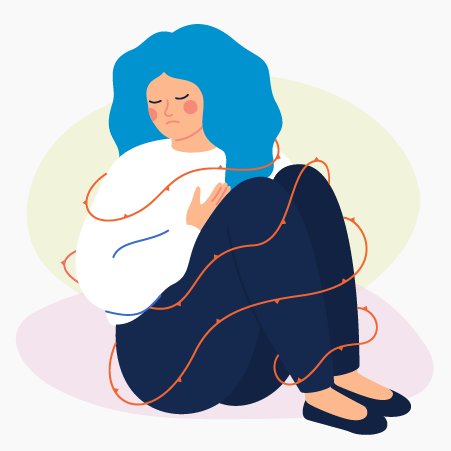What is Self-Harm?
 Self-harm or self-injury means hurting yourself on purpose. One common method is cutting with a sharp object. But any time someone deliberately hurts themself is classified as self-harm. Some people feel an impulse to cause burns, pull out hair or pick at wounds to prevent healing. Extreme injuries can result in broken bones.
Self-harm or self-injury means hurting yourself on purpose. One common method is cutting with a sharp object. But any time someone deliberately hurts themself is classified as self-harm. Some people feel an impulse to cause burns, pull out hair or pick at wounds to prevent healing. Extreme injuries can result in broken bones.
Hurting yourself—or thinking about hurting yourself—is a sign of emotional distress. These uncomfortable emotions may grow more intense if a person continues to use self-harm as a coping mechanism. Learning other ways to tolerate the mental pain will make you stronger in the long term.
Self-harm also causes feelings of shame. The scars caused by frequent cutting or burning can be permanent. Drinking alcohol or doing drugs while hurting yourself increases the risk of a more severe injury than intended. And it takes time and energy away from other things you value. Skipping classes to change bandages or avoiding social occasions to prevent people from seeing your scars is a sign that your habit is negatively affecting work and relationships.
Why People Self-harm
Self-harm is not a mental illness, but a behavior that indicates a need for better coping skills. Several illnesses are associated with it, including borderline personality disorder, depression, eating disorders, anxiety or posttraumatic distress disorder.
Self-harm occurs most often during the teenage and young adult years, though it can also happen later in life. Those at the most risk are people who have experienced trauma, neglect or abuse.
The urge to hurt yourself may start with overwhelming anger, frustration or pain. When a person is not sure how to deal with emotions, or learned as a child to hide emotions, self-harm may feel like a release. Sometimes, injuring yourself stimulates the body’s endorphins or pain-killing hormones, thus raising their mood. Or if a person doesn’t feel many emotions, they might cause themself pain in order to feel something “real” to replace emotional numbness.
Once a person injures themself, they may experience shame and guilt. If the shame leads to intense negative feelings, that person may hurt themself again. The behavior can thus become a dangerous cycle and a long-time habit. Some people even create rituals around it.
Self-harm isn’t the same as attempting suicide. However, it is a symptom of emotional pain that should be taken seriously. If someone is hurting themself, they may be at an increased risk of feeling suicidal. It’s important to find treatment for the underlying emotions.
Treatment and Coping
There are effective treatments for self-harm that can allow a person to feel in control again. Psychotherapy is important to any treatment plan. Self-harm may feel necessary to manage emotions, so a person will need to learn new coping mechanisms.
Depending on any underlying illness, a doctor may prescribe medication to help with difficult emotions. For someone with depression, for instance, an antidepressant may lessen harmful urges.
A doctor will also recommend therapy to help a person learn new behaviors, if self-injury has become a habit. Several different kinds of therapy can help, depending on the diagnosis.
- Psychodynamic therapy focuses on exploring past experiences and emotions
- Cognitive behavioral therapy focuses on recognizing negative thought patterns and increasing coping skills
- Dialectical behavioral therapy can help a person learn positive coping methods
Excerpted from “Self Harm” from the National Alliance on Mental Illness. Read the full article online for more information on self harm and what to do when someone self harms.
Source: NAMI | Self Harm, https://www.nami.org/About-Mental-Illness/Common-with-Mental-Illness/Self-harm | Copyright © 2022 NAMI
A screening can help you determine if you or someone you care about should contact a mental health professional. Care Coordinators can arrange a free 30-minute Care Consultation so you can explore options with an expert. Call or email us at 650.688.3625 or careteam@chconline.org to set up an initial Consultation appointment.





